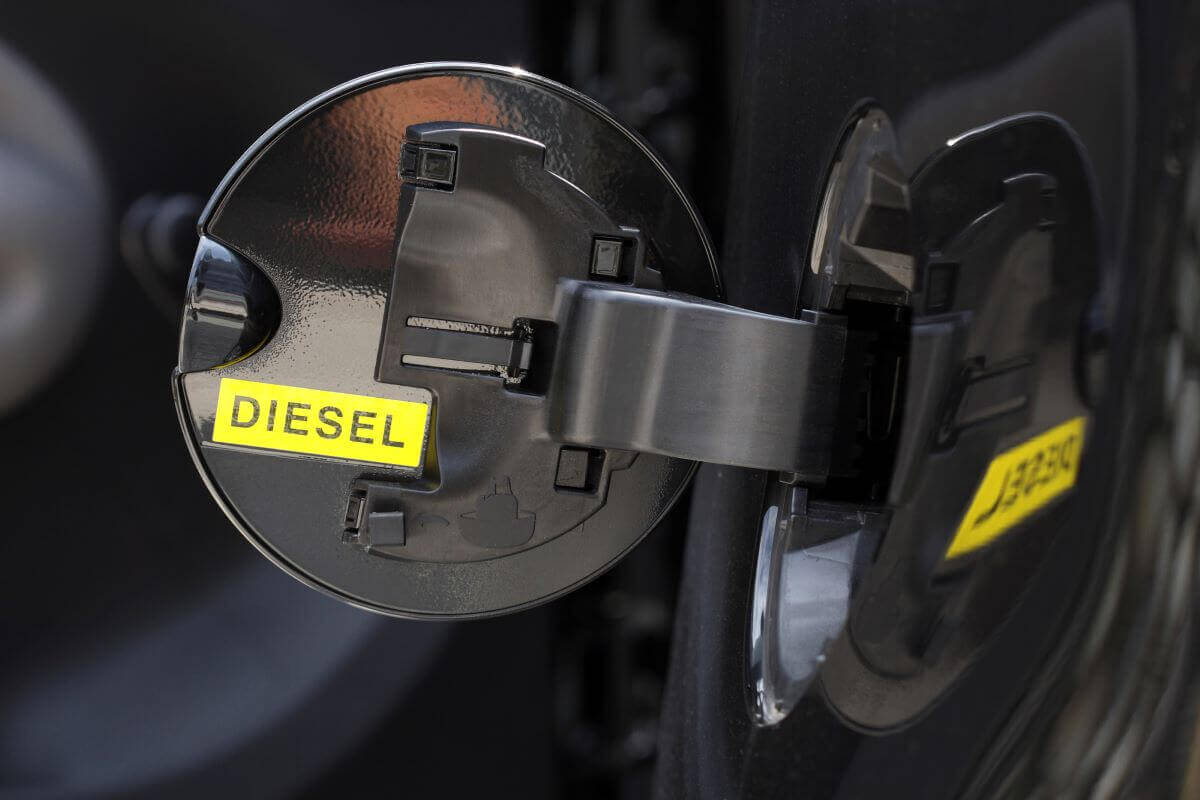Wondering if diesel goes bad in tank? Learn about the factors affecting diesel quality, of diesel going bad, and how to prevent it from happening. Discover the proper disposal methods for bad to avoid environmental concerns.

Does Diesel Go Bad in Tank?
Diesel fuel has a reputation for being durable and long-lasting, but does it ever go bad in your tank? The answer is yes, diesel can go bad, and several factors can affect its quality, leading to a slew of issues for your engine.
Factors Affecting Diesel Quality
Several factors can impact the quality of diesel fuel, including contamination, temperature, and exposure to air. Contamination can take many forms, such as water or debris, and can cause significant damage to your engine’s fuel system. Temperature is another significant factor, with high temperatures causing the fuel to degrade faster. Finally, exposure to air can lead to the growth of bacteria and fungi, which can cause significant damage to your engine.
Signs of Diesel Going Bad
Despite its reputation for being a long-lasting fuel, diesel can still go bad, leading to several signs that may indicate that your fuel is no longer usable. The most common signs of diesel going bad include a change in color, a foul odor, sediment formation, clogged filters, and poor engine performance. If you notice any of these signs, it’s essential to address the issue promptly to avoid further damage to your engine.
Factors Affecting Diesel Quality
Diesel fuel is known for its durability, stability, and efficiency. However, several factors can affect its quality, leading to poor engine performance and costly repairs. In this section, we will discuss the three primary that affect diesel quality: contamination, temperature, and exposure to air.
Contamination
Contamination is one of the most common that affect diesel quality. It occurs when harmful substances, such as water, dirt, and bacteria, enter the fuel tank. These contaminants can cause several problems, including clogged filters, sediment formation, and poor engine performance.
Water is the most common type of contamination in diesel fuel. It can enter the fuel tank through condensation, leakage, or poor storage practices. When water mixes with diesel fuel, it creates a breeding ground for bacteria and fungi, which can damage the fuel system and cause corrosion.
Dirt and debris can also contaminate diesel fuel. They can enter the fuel through the fueling process or through a dirty storage container. When dirt and debris accumulate in the fuel system, they can clog fuel filters and cause engine damage.
To prevent contamination, it is crucial to store diesel fuel properly and use high-quality filters. Regular maintenance and inspection of the fuel system can also help detect and prevent contamination.
Temperature
Temperature is another critical factor that affects diesel quality. Diesel fuel tends to thicken and gel at low temperatures, which can cause several problems, including clogged fuel filters and engine damage. On the other hand, high temperatures can cause diesel fuel to break down and oxidize, leading to poor engine performance and fuel efficiency.
To prevent temperature-related issues, it is essential to use the right type of diesel fuel for the weather conditions. In cold weather, it is advisable to use winter-grade diesel fuel, which has a lower gel point than regular diesel fuel. In hot weather, it is crucial to keep the fuel tank cool and avoid overfilling it, which can cause the fuel to expand and overflow.
Exposure to Air
Exposure to air is another factor that affects diesel quality. When diesel fuel is exposed to air, it reacts with oxygen, which can cause oxidation and chemical breakdown. This can lead to the formation of harmful byproducts, such as gums and varnishes, which can clog fuel filters and cause engine damage.
To prevent exposure to air, it is crucial to store diesel fuel in airtight containers and avoid overfilling the fuel tank. Regular use of fuel stabilizers can also help prevent oxidation and chemical breakdown.
Signs of Diesel Going Bad
Diesel fuel is an essential component of many vehicles and machines, but it can go bad over time. There are several signs to look out for that indicate your diesel fuel may be going bad. Here are the most common signs:
Change in Color
One of the most noticeable signs that your diesel fuel is going bad is a change in color. Fresh diesel fuel is typically a light amber color, but as it ages, it can turn dark and cloudy. This is due to the formation of sediment and other contaminants that can cause problems for your engine. If you notice a significant change in the color of your diesel fuel, it may be time to have it inspected and potentially replaced.
Foul Odor
Another sign that your fuel is going bad is a foul odor. Fresh diesel fuel has a distinct, mild smell that is not unpleasant. However, as it ages and becomes contaminated, it can develop a strong, pungent odor that is hard to ignore. This odor can indicate the presence of bacteria or other harmful contaminants that can damage your engine. If you notice a foul odor coming from your diesel fuel, it is essential to have it checked as soon as possible.
Sediment Formation
As diesel fuel ages, it can begin to form sediment at the bottom of the tank. This is due to the buildup of contaminants and other impurities that settle out of the fuel over time. The sediment can clog fuel filters and damage engine components, leading to poor performance and potentially costly repairs. If you notice sediment forming in your fuel tank, it is crucial to have it removed and replaced with fresh fuel.
Clogged Filters
Clogged fuel filters are another common sign that your diesel fuel is going bad. As contaminants and impurities build up in the fuel, they can clog the filters that are designed to remove them. This can cause your engine to run poorly, with reduced power and efficiency. If you notice that your fuel filters are becoming clogged more frequently than usual, it may be a sign that your diesel fuel is going bad.
Poor Engine Performance
Perhaps the most significant sign that your diesel fuel is going bad is poor engine performance. As contaminants and impurities build up in your fuel, they can cause your engine to run poorly, with reduced power, efficiency, and acceleration. You may notice that your engine is running rough or emitting more smoke than usual. If you experience poor engine performance, it is essential to have your fuel checked and potentially replaced to avoid costly repairs.
Preventing Diesel from Going Bad
Diesel fuel is a precious commodity, and it is essential to keep it in good condition. Many factors can affect diesel quality, such as contamination, temperature, and exposure to air. Moreover, diesel that has gone bad can lead to clogged filters, poor engine performance, and other issues that can be costly and time-consuming to fix. However, there are ways to prevent diesel from going bad, and in this section, we will explore some of the best practices to keep diesel fuel in top shape.
Storing Diesel Properly
One of the most critical steps in preventing diesel fuel from going bad is proper storage. Diesel fuel should be stored in a clean, dry, and cool place to avoid contamination and temperature changes. Ideally, diesel should be kept in a tank or a container that is specifically designed for fuel storage. The or container should be made of a non-corrosive material, such as steel or plastic, and should be equipped with a tight-fitting lid or cap to prevent air from entering. Additionally, it is essential to keep the tank or container clean and free of water, dirt, or debris, which can cause contamination.
Using Fuel Additives
Another way to prevent diesel from going bad is to use fuel additives. Fuel additives are chemical compounds that can improve diesel quality, enhance fuel efficiency, and reduce emissions. There are various types of fuel additives available in the market, such as stabilizers, biocides, and lubricants. Stabilizers can help prevent the formation of gums and varnishes in diesel fuel, which can cause clogged filters and poor engine performance. Biocides can kill bacteria and fungi that can grow in diesel fuel and cause contamination. Lubricants can help protect the fuel system components from wear and tear and extend their lifespan.
Regular Maintenance and Inspection
Regular maintenance and inspection are essential to keep diesel fuel in good condition. Diesel engines and fuel systems should be inspected and serviced regularly to ensure that they are operating efficiently and safely. This includes checking fuel filters, fuel lines, injectors, and pumps for of wear or damage. Additionally, it is crucial to drain and replace the fuel in the tank or container periodically to avoid contamination and degradation. The frequency of maintenance and inspection may vary depending on the type and age of the diesel engine and fuel system, as well as the operating conditions.
How to Dispose of Bad Diesel
If you’re dealing with bad diesel, you may be wondering what to do with it. It’s important to dispose of it properly to prevent harm to the environment and potential legal consequences. In this section, we’ll discuss the environmental concerns associated with bad diesel and the proper methods.
Environmental Concerns
Bad diesel can have negative environmental impacts, especially if it’s disposed of improperly. Diesel that’s been contaminated can release harmful pollutants into the air, soil, and water. These pollutants can cause harm to plants, animals, and humans.
When diesel is burned, it releases a variety of pollutants, including nitrogen oxides, sulfur oxides, and particulate matter. These pollutants can contribute to smog, acid rain, and respiratory problems. In addition, if bad diesel is spilled on the ground, it can contaminate soil and groundwater, which can be difficult and expensive to clean up.
Proper Disposal Methods
Properly disposing of bad diesel is important to protect the environment and avoid legal consequences. Here are some methods to consider:
- Recycling: One option for disposing of bad diesel is to recycle it. Some companies specialize in recycling used oil and other petroleum products. Recycled diesel can be used for heating or as fuel for industrial processes.
- Disposal at a hazardous waste facility: Another option is to dispose of bad diesel at a hazardous waste facility. These facilities are designed to handle toxic and hazardous materials and ensure they’re disposed of safely.
- Contact local authorities: You can also contact your local authorities to find out if they have any programs for disposing of hazardous waste. Some cities have special events or drop-off locations for hazardous materials.
It’s important to note that pouring bad diesel down the drain or into the garbage is illegal and can lead to fines and other legal consequences. It’s also important to store bad diesel in a secure container to prevent spills or leaks.
In summary, properly disposing of bad diesel is crucial to protect the environment and avoid legal consequences. Recycling, disposal at a hazardous waste facility, and contacting local authorities are all viable options for disposal. Remember to store bad diesel in a secure container and never pour it down the drain or into the garbage.


